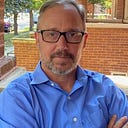A Bigger Adventure
I told my 16-year-old daughter it’s time for her to stop pining for this summer to be like last summer, and start thinking about … what, exactly?
I’ve been reading Erik Larson’s fine new book about Churchill in 1940, and I think it had something to do with a conversation Monday afternoon at the tennis courts at Smith Park, with my 16-year-old daughter.
I’d just accidentally reduced her to tears by telling her a soft-soaped version of a New York Times Daily interview I’d heard. The newspaper’s health and science reporter sounded damned credible when he said that American life will be weird, and maybe very weird, not for months but for years to come.
My wife thought it was premature to tell her that, but it seems to me that, seven weeks into this nightmare — and with so much heavy fog ahead— it seems it’s time the kid stops fantasizing about a summer at North Avenue beach, traveling soccer tournaments and a return to high school normalcy next fall.
And starts thinking … about what, exactly?
As we waited for a court to open up, I haltingly began to tell her she needs to start thinking … more broadly about life’s great adventure.
I told her that one reason we are all knocked so completely on our asses by the coronavirus crisis is that in America, we haven’t had a broadly life-disrupting event in the seventy-five years since World War II ended. World War II, when my dad was plucked right out of the University of Virginia and traded in his white bucks for army boots on a mosquito-infested base in Georgia and then was put on a ship and sent across the ocean, “for the duration.”
But in the decade before that, there’d been the Great Depression. About a decade before that, World War I and Spanish Influenza. And in Independence Day parades back then, they’d wheel veterans of the fucking Civil War! And lots of death and disease and danger all the time back then, between all those events.
But after 75 years of relatively predictable school careers and graduations and sports and proms for a lot of people, we are culturally unprepared — not just kids, but parents and even grandparents — for what we are staring at.
As a society, we haven’t prepared for this civically or politically. And as individuals, we haven’t prepared intellectually, emotionally or spiritually. As Fran Lebowitz said recently, “It is a very startling thing to be my age — I’m sixty-nine — and to have something happen that doesn’t remind you of anything else.”
So I appealed to what I have already taught my 16-year-old since the beginning —
— a sense of adventure, physical toughness and spirit. I explained all that history that this virus now connects us with, and I asked her to try to begin thinking of being a part of that — part of “a bigger adventure” than what she’d ever expected life to be. Bigger than the games we have invented — sports, high school social drama, SAT scores. And lasting, in one form or another, for at least as long as the rest of her high school career.
“But you’re supposed to cherish your senior year of high school!” she said.
Not that none of the old pleasures will be a part of her life — and not that life won’t have new pleasures to compensate — but that life will be different enough that pining for this summer to be like last summer and wondering feverishly when Lollapalooza will be back is less useful than thinking more openly, more broadly, about what is needed, what is possible, and what we can achieve in this life, as we stand here and look at it now.
“I don’t want to do that,” she said with a tear in her eye.
“I know, Honey, I don’t want to do it either,” I said with a tear in mine. “But I think we need to at least start thinking that way.”
Luckily, a court opened up just then, and we took to it.
And you know, I’ve never seen her play harder in her young life.
David Murray is executive director of the Executive Communication Council and the Professional Speechwriters Association, which publish Executive Communication Report: Coronavirus, a daily newsletter for those helping leaders communicate through the crisis.
